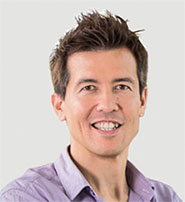Industry Leaders in Signal Processing and Machine Learning: Greg Mori

 Greg Mori is Senior Research Director for RBC's Borealis AI and a Professor in the School of Computing Science at Simon Fraser University. Greg Mori was born in Vancouver and grew up in Richmond, BC. He received a Ph.D. degree from UC Berkeley in 2004 and an Hon. B.Sc. from the University of Toronto in 1999. He was a Visiting Scientist at Google in 2014-2015. He served as Director of the School of Computing Science at Simon Fraser University from 2015-2018. He has served as a scientific advisor to numerous machine learning start-ups. Greg Mori conducts research in computer vision and machine learning, and teaches classes in data structures and programming, artificial intelligence, computer vision, and machine learning. He received the Canadian Image Processing and Pattern Recognition Society (CIPPRS) Award for Research Excellence and Service in 2008, NSERC Discovery Accelerator Supplement awards in 2008 and 2015, and the ICCV Helmholtz Prize in 2017. He was a Program Chair for CVPR 2020 and will be a General Chair for CVPR 2023.
Greg Mori is Senior Research Director for RBC's Borealis AI and a Professor in the School of Computing Science at Simon Fraser University. Greg Mori was born in Vancouver and grew up in Richmond, BC. He received a Ph.D. degree from UC Berkeley in 2004 and an Hon. B.Sc. from the University of Toronto in 1999. He was a Visiting Scientist at Google in 2014-2015. He served as Director of the School of Computing Science at Simon Fraser University from 2015-2018. He has served as a scientific advisor to numerous machine learning start-ups. Greg Mori conducts research in computer vision and machine learning, and teaches classes in data structures and programming, artificial intelligence, computer vision, and machine learning. He received the Canadian Image Processing and Pattern Recognition Society (CIPPRS) Award for Research Excellence and Service in 2008, NSERC Discovery Accelerator Supplement awards in 2008 and 2015, and the ICCV Helmholtz Prize in 2017. He was a Program Chair for CVPR 2020 and will be a General Chair for CVPR 2023.
We approached Greg Mori with a few questions:
1. In your own words, please tell us about your background.
I am fortunate to have been supported by many great colleagues and mentors over my career. The main professional challenges I have faced are those that I think afflict many grad students / researchers. Others have characterized this in different ways, I like the framing of "3 rude questions to ask a grad student":
1. What do you work on? 2. When will you be finished? 3. What will you do next?
The first one seems innocuous but is very hard to answer, especially as a junior researcher. If I answer "I work on computer vision", this can be followed by "no, really, specifically, what do you do? What problems or methods or novel things do you contribute?" It is such a struggle to answer well. Beyond this, once you've answered it, the process probably needs to start over again, since if you've figured out what you're doing, it probably works, and you probably need to start thinking of something else soon. This constant challenge of questioning your role as a researcher is very difficult.
The other two questions have similar challenges to them, which I would defer to future work (smile).
2. What was the most important factor in your success?
My students. I have had the privilege to work with many wonderful people at all levels -- from undergrads to MSc to PhD to postdocs.
The technical side is probably readily apparent, my work is in collaboration with students. It is very difficult to produce impactful computer vision or machine learning research working alone. We create new ideas, and implement, analyze, and advocate for their adoption together.
The personal side may not be as obvious. Supporting students in their journey as researchers and as people motivates me. Research is about contributing to knowledge. Helping students make their own contributions, and seeing them grow as people is a rewarding experience.
Research is a long process that requires dedication. I enjoy working on challenging "North Star" research problems such as human activity recognition -- a problem that the community can work on over decades (see above on "what do you work on"). Working with students on these problems, the camaraderie around paper deadlines, sharing the euphoria of successful results, the struggles around algorithms that don't work, and seeing students grow as researchers and bringing their own ideas and style to approach these problems, these make the research process gratifying.
3. How does your work affect society?
My research is in computer vision, and is concerned with developing algorithms that automatically interpret images and videos, particularly those containing people. I have worked towards solving the problems of human pose estimation and human activity recognition.
There are myriad use cases for this type of technology. I have collaborated with transportation engineers to study the design of road systems, for example pedestrian crosswalks. Human activity recognition systems can be used to collect data to support decisions on which types of crosswalks will result in fewer dangerous interactions between vehicles and pedestrians.
As another example, I collaborated with a team studying falls by elderly residents of long-term care facilities. Better understanding the circumstances of falls can lead to treatments such as changing furniture, flooring, or other factors that can reduce their occurrence.
However, clearly not all surveillance applications are benign. The same technologies can be used to monitor individuals and the data derived automatically from these algorithms can be biased. I particularly appreciate the work the NeurIPS community is doing on bringing these issues to the fore via impact statements in papers.
4. If there is one take home message you would like the readers of this interview to take away, what would that be?
Research outcomes are exciting and involve overcoming many challenges; working with people on these challenges is rewarding in itself.
5. Failures are an inevitable part of everyone’s career journey, what is the most important lesson you have learned during your career when dealing with failures?
Honesty with others and yourself.
Many of the papers I have written were rejected at least once, and typically experienced failures in the form of ideas that didn't work before we found ones that did. On the other hand, all of my ideas that didn't work obviously experienced failures. How does one tell the difference, and know which ideas are worth pursuing further?
Being honest about what has happened lets us move forward in the right way. Is there a bug in the implementation? Talk about it openly. Is my idea from 3 months ago really that good? Be willing to acknowledge your own mistakes. Is this algorithm really better than the current standard? Be honest about others' strengths. As you noted, failure is inevitable so being comfortable and honest about it is important.
6. Although novelty and innovation are the most important factor for technological advancement, when a researcher, scientist or engineer has a new idea, there are a lot of push backs until they prove that the new idea actually works. What is your advice on how to handle them? Especially for the readers who are in the early stages of their career.
This push back is a healthy part of the scientific process. I feel we need to hold two conflicting positions simultaneously as researchers -- conviction that we are correct (so that we keep pursuing an idea), and skepticism about what we believe (so that we find flaws in our thinking). The same is true when reading others' work, trust so that we can build on it, and critical thinking to see what could be done better.
I feel it's important to embrace this push back, know that it's part of making our ideas stronger, and work to overcome those doubts via theory and evidence that an idea works.
To learn more about Greg Mori and for more information, visit his webpage.

